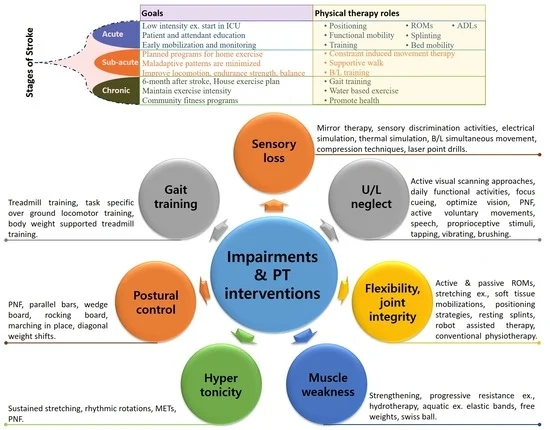The Benefits of Early Rehabilitation: Speeding Up Recovery After Surgery
Surgery is often a necessary step for individuals seeking relief from pain, injury, or medical conditions, but the recovery process that follows can be long and challenging. Early rehabilitation plays a crucial role in ensuring a faster, more efficient recovery. Post-surgery recovery can be significantly improved with the right approach, and one of the most effective methods is engaging in physiotherapy as soon as possible after surgery. In this article, we will explore the benefits of early rehabilitation, how it helps speed up recovery, and why it is essential for achieving optimal outcomes after surgery.
1. What is Early Rehabilitation?
Early rehabilitation refers to starting a tailored rehabilitation program shortly after surgery. Rather than waiting for months to recover, patients begin engaging in physiotherapy soon after the surgical site has healed enough for movement and exercise to be safely performed. Physiotherapy focuses on restoring function, increasing strength, and improving mobility through targeted exercises, stretching, and manual therapy techniques.
By beginning rehabilitation early, patients are better able to minimize complications, reduce pain, and maintain or regain strength, flexibility, and overall functionality. The sooner rehabilitation starts, the sooner the body can adapt and heal more efficiently, leading to a faster return to daily activities and overall well-being.
2. Preventing Complications and Secondary Health Issues
One of the most significant advantages of early rehabilitation is its ability to prevent complications that can arise from immobility. After surgery, patients may experience stiffness, swelling, or weakness in the affected area. Without movement, muscles can weaken, and joints can become stiff, which can delay recovery and make it harder to regain strength.
- Muscle Atrophy: Prolonged immobility can cause muscle wasting (atrophy). Early physiotherapy helps maintain muscle strength and mass by engaging the muscles in low-impact exercises. This reduces the risk of long-term muscle loss and improves functional recovery.
- Joint Stiffness and Contractures: Lack of movement can cause joints to stiffen, leading to difficulty in bending or extending them properly. Early rehabilitation involves specific exercises that keep joints moving, preventing contractures and improving range of motion.
- Reduced Risk of Blood Clots:Early movement after surgery improves circulation, which helps prevent the formation of blood clots, a common risk after surgery, particularly in the legs. This helps ensure better circulation and reduces the risk of complications like deep vein thrombosis (DVT).
3. Reducing Pain and Swelling
Pain and swelling are common after surgery, especially in the first few days or weeks. Early physiotherapy helps reduce both by promoting circulation, reducing inflammation, and improving tissue flexibility.
- Pain Management: Physiotherapists use various techniques such as gentle mobilization, massage therapy, and heat or cold treatments to help alleviate pain. By starting therapy early, patients often experience reduced pain intensity and improved comfort, which can have a positive effect on mental well-being.
- Reducing Swelling: Early rehabilitation exercises help stimulate blood flow, reducing the likelihood of fluid buildup and promoting faster healing. By engaging in controlled movements, swelling can be minimized, making the healing process smoother.
4. Promoting Faster Recovery and Regaining Function
Starting rehabilitation early is key to achieving a quicker recovery. Whether it’s recovering from a joint replacement, spinal surgery, or any other surgical procedure, physiotherapy speeds up the process of regaining normal function.
- Restoring Mobility: One of the primary goals of early rehabilitation is to restore mobility. Specific exercises are designed to improve range of motion and help patients regain full movement in the affected body part. The sooner movement begins, the quicker the muscles and joints recover their flexibility and strength.
- Strengthening Muscles: Post-surgery rehabilitation helps strengthen muscles weakened by the surgery and immobilization. By engaging in strengthening exercises early on, patients are better equipped to return to their normal routine and maintain their independence.
5. Improving Mental Health and Motivation
Surgery can be emotionally taxing, and recovery can often feel overwhelming. Early rehabilitation offers not only physical benefits but also psychological ones.
- Boosting Mental Health: Early physiotherapy helps improve mood and reduces the stress and anxiety that may come with the recovery process. As patients start to feel better and regain functionality, their confidence grows, which has a positive impact on their mental health.
- Increased Motivation: Engaging in rehabilitation early provides patients with a sense of accomplishment as they see improvement in strength and mobility. This boost in motivation can inspire individuals to stay committed to their recovery plan, which is essential for long-term success.
6. Customized Treatment for Individual Needs
Early rehabilitation is highly individualized, ensuring that each patient’s unique needs and goals are addressed. Physiotherapists create personalized treatment plans based on the type of surgery, the patient’s overall health, and their specific recovery goals. This ensures that the rehabilitation process is as effective as possible.
- Progressive Therapy: As patients improve, the physiotherapy program adapts to challenge them progressively. This helps patients continue to make gains without overloading them. Adjustments to the treatment plan ensure that the patient is always working within their current physical abilities.
7. Accelerating the Return to Normal Activities
Ultimately, the goal of early rehabilitation is to help patients return to their everyday activities as quickly as possible. By addressing the physical challenges associated with recovery early on, patients are able to regain their independence and resume work, social activities, and hobbies sooner.
Whether it’s walking, driving, or resuming an active lifestyle, physiotherapy helps ensure a smooth transition back to normal life. This means that early rehabilitation not only speeds up recovery physically but also enables individuals to enjoy a fuller, more active life after surgery.
Early rehabilitation plays a critical role in post-surgery joint recovery, offering a wide range of benefits from preventing complications to promoting faster recovery and improved mobility. By engaging in physiotherapy soon after surgery, patients can reduce pain and swelling, restore strength, prevent muscle and joint deterioration, and improve their overall quality of life. The faster patients begin rehabilitation, the quicker they recover and regain their independence. If you or a loved one is undergoing surgery, early physiotherapy intervention is essential for achieving the best possible recovery outcomes and a smoother, faster return to daily activities. In homes for elderly for people with dementia there are specialists who help old people.



